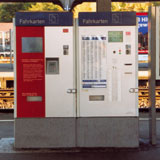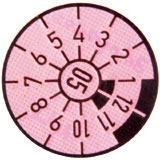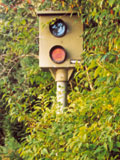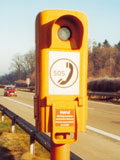Transport
Public Transport

Many destinations in Germany can be reached by train, tram or bus. Trains, undergrounds railways ("U-Bahn"), suburban railways ("S-Bahn"), trams and buses provide transport locally and regionally. Public transport within a city and the adjoining region is called "ÖPNV" ("Öffentlicher Personennahverkehr").

Tickets for trams, buses and short distances with a train must be bought at a ticket machine. The price of each ticket is often related to the distance travelled and is divided into zones, the so-called "Tarifzonen". Ticket machines can be difficult to use. If you are unable to purchase the ticket you require, just ask another traveller who is purchasing a ticket. Travelling without a ticket ("Schwarzfahren") is not permitted and incurs a fine of at least 30 euros on all buses and trains.
If you use public transport regularly then special discounted tickets can be purchased from the local public transport company. Tickets with ten trips ("Zehnerkarten") at reduced prices or monthly or yearly tickets ("Monatskarten" or "Jahreskarten") can be purchased. Ticket issuing offices have information on the type of ticket best suited to you.
Trains: Regional and Long Distance
The German rail company, the "Deutsche Bahn" ("DB") – also known as "Die Bahn", runs trains over longer distances. The Deutsche Bahn has a complicated pricing system with many possibilities to save money if used to full advantage. If you buy your ticket several days in advance the fare is often cheaper. However, your single or return tickets are valid only for a specific train connection. It is also recommended to book in advance because of the limited number of tickets. If you travel with a friend, the second person only has to pay half price. Children up to the age of 14 travelling with their parents or grandparents travel free of charge.
If you use the "Deutsche Bahn" often then it is recommended to use a "BahnCard". Depending on the type of "BahnCard", you can get a reduction of 25 per cent in addition to the other reductions or 50 per cent off the original price. It’s worth using the "BahnCard100" if you travel long distances everyday.
It is good to know as early as possible when and where you are travelling. If you combine the various saving possibilities, the "Deutsche Bahn" can be a cost-effective way of travelling. There are also other offers available such as the Happy Weekend Ticket ("Schönes-Wochenende-Ticket"), the state ticket ("Länderticket") or monthly and yearly tickets ("Monatskarten" and "Jahreskarten"). The "Interrail Ticket" allows young people (under the age of 26) to travel all over Europe for around 300 euros.
You can get information at travel agencies of the "Deutsche Bahn" or on the Internet at ![]() www.bahn.de.
www.bahn.de.
Taxis

There are numerous taxi stands in larger urban areas and taxis can also be hailed on the street as they drive by. In smaller towns and areas that have limited transport possibilities, it is better to pre-book taxis. Taxi centres can be called to order taxis. Telephone numbers can be found in the telephone directory. One specific feature is the "Kurzstrecke" (short trip). If you hail a driving taxi and only want to travel a short distance then you can ask the driver for a low-cost "Kurzstrecke" (which costs around 3 euros). Otherwise taxis have set prices.
Travelling With Others
One possibility to travel cheaply is the "Mitfahrgelegenheit". This is a service provided by people travelling long distances by car. Many cities have what is called a "Mitfahrzentrale" (short: "MFZ"), an office that takes offers from car drivers who are looking for people to share the costs of travelling.
These offices can be found in the telephone directory or on the Internet at ![]() www.mfz.de or
www.mfz.de or ![]() www.mitfahrgelegenheit.de.
www.mitfahrgelegenheit.de.
Cars

Cars have to be insured and registered before they can be driven on German roads. The car also has to have a technical inspection to prove that it is roadworthy. This is called the "TÜV". An emissions test called the "ASU" also has to be passed.
Driving Licence
Driving licences from other member states of the European Union are valid in Germany. All other licences including "International driving licences" are normally only valid for six months. Before the time elapses a German licence must be applied for at the appropriate authority, in this case the "Ordnungamt". Please make enquiries as early as possible on the validity of your licence at your local authorities.
Registration
Every car, motorbike and other motorised vehicle must at least have third party insurance ("Haftpflichtversicherung"). Insurance providers vary in costs and services provided. If you have decided to get insurance for your car then the insurer will provide you with a certificate known as a "Doppelkarte". This certificate, along with the vehicle registration documents and the "TÜV" and "ASU" certificates must be presented to the authorities at your local road traffic licensing department ("Straßenverkehrsamt"). Only then will a number plate be issued. Without this number plate it is not permitted to drive on German roads.
TÜV and ASU
The technical safety of your car – called "PKW" or "Personenkraftwagen" in German – must be checked every two years. The "TÜV" inspection is carried out by the "Technische Überwachungs-Verein" amongst others. The emissions test is also carried out by this body. This emissions test is called the "Abgas-Sonder-Untersuchung" or "ASU". The "ASU" can also be done at your local garage.

Car Insurance
The mandatory third party insurance is only one of a range of insurance policies available. Cars can also be insured against damage caused to the car itself even if it was the fault of the insured driver. These insurance policies are called "Teilkaskoversicherung", which gives coverage above a certain set monetary limit, and "Vollkaskoversicherung", which covers the entire damage caused. If the damage is caused by the insured and the damage is claimed from the insurer then the premiums will often rise. It is therefore often wiser to pay damages to a certain limit out of your own pocket rather than asking the insurer to cover the costs. The limit depends on the difference between the premiums before and after the damage is paid and the amount the insured person has to pay as part of the insurance contract (called "Eigenbeteiligung" in German). It is advisable to contact your insurer to work out the difference in premiums. Premiums only fall when the insured is accident-free or does not claim any damage costs from the insurer.
Highway Code
Germany has a highway code (set of rules for the road). Just as in the majority of countries in the world, red means stop and green means go. Here is a list of certain road rules in Germany. All passengers must put on seat belts. Children under the age of 12 must sit in a child seat ("Kindersitz") unless they are taller than 1.5 m. The speed limit within town and city boundaries is 50 km/h. Many residential areas and areas near schools and Kindergärten have a speed limit of 30 km/h ("verkehrsberuhigte Zonen"). Cars are only allowed to drive at walking pace in especially signposted play streets ("Spielstraßen"). Outside city limits, on "country roads", the limit is usually 80 km/h. If there are no signs restricting speed on motorways then drivers are advised to drive at the "recommended speed" of 130 km/h.
There is also advice available on the Internet at ![]() www.fahrtipps.de.
www.fahrtipps.de.
People who do not abide by the highway code will often be fined and even lose their licence. Serious breaches of traffic rules are punished on a points system. These points are registered centrally in a database (called the "Flensburger Verkehrssünder-Datei") in the northern Germany city of Flensburg. As soon as a specific number of points has been accumulated, the offender has their licence withdrawn and is forbidden from driving for a period of time.
Radar Speed Checks

The police in Germany often use radar speed checks ("Radarkontrollen") to catch drivers who may be breaking the speed limit. There are also a number of radar speed boxes (called "Starenkästen") permanently installed on some roads. Note: Driving too fast ("Rasen") on German roads is expensive and can also mean a temporary driving ban.
Drunk Driving
In Germany the legal blood alcohol limit is 0.5 per mil. One beer or a glass of wine is enough to reach this limit. If you are caught with a higher blood alcohol level (as a result of a breath or blood test), then heavy fines are usually imposed and the licence is often withdrawn. If a driver is involved in an accident and found to be under the influence of alcohol, then – irrespective of who caused the accident – the driver is liable to be prosecuted even with blood alcohol levels less than 0.5 per mil.
First Aid

If someone is involved in an accident or is the first person on the scene of an accident, first aid ("Erste Hilfe") must be given. This person must also call the police and/or an ambulance. Should you leave the scene of an accident without giving first aid, you could be prosecuted for failing to render assistance ("unterlassene Hilfeleistung"). The German Red Cross ("Deutsches Rotes Kreuz" or "DRK" for short) offers regular first aid courses that teach you how to respond in such situations.
Automobile Clubs
There are various automobile clubs that offer various services. Some offer assistance if a car breaks down on the road and special travel insurance. The "ADAC" ("Allgemeiner Deutscher Auto Club") and the "ACE" ("Auto Club Europa") are the largest organisations. The "VCD" ("Verkehrs-Club Deutschland") mainly represents the interests of train passengers and cyclists, and offers many services for people using these modes of transport. An annual membership fee has to be paid. The respective Internet addresses of the clubs are:
![]() www.adac.de
www.adac.de
![]() www.ace-online.de
www.ace-online.de
![]() www.vcd.org
www.vcd.org
Accidents and Breakdowns

There are orange SOS telephones ("Notrufsäulen") at regular intervals on all motorways. These SOS telephones are there so that you can report accidents and breakdowns and call for assistance. Small arrows on the black and white columns at the side of the road indicate where the nearest SOS telephone is situated. You can also call for assistance by using a mobile phone. The number in case of emergency is 110.
Parking
There are many areas in inner cities where parking is only allowed after a fee is paid. Normally you have to look for a parking machine, buy a ticket for a certain length of time and display this ticket on the inside of the windscreen. If you park without a ticket or if the ticket has run out, a fine is usually imposed. If you hold up traffic by parking illegally then your car may be towed away. Parking spaces are in short supply in most cities and usually expensive. It is advisable to use public transport instead.
Car Wash
Cars can only be washed at specific car washes called "Autowaschanlagen", or in streets or areas designated for washing cars ("Autowaschstraßen" and "Waschplätze"). Should you breach these laws, which are designed to protect the environment, you could be prosecuted.
Cycling
Bicycles are a much-loved mode of transport in Germany. There are numerous cycling lanes and routes in German cities and in the countryside. A map of these routes can be acquired from the "ADFC" ("Allgemeiner Deutscher Fahrrad-Club"). This is an organisation that represents the special interests of cyclists and provides specific service information for them. Cyclists must also obey the highway code and bikes must be in good working order (brakes, lights etc).
Children can learn the highway code at school or at courses run by the police.
You can find information at ![]() www.adfc.de
www.adfc.de
